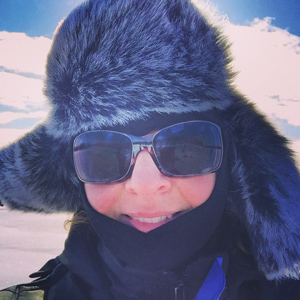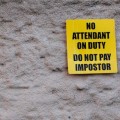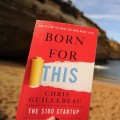Dream Jobs Don’t Always Have Glamorous Beginnings
This is a traveler story. (Read others or nominate yourself.)
Rosemary Behan has crafted a career in journalism that allows her to travel the world. In this profile, she shares how she got started—and how you can still break into the changing world of travel writing.
Here’s her story:
I’m a travel writer and editor based in Abu Dhabi, the capital of the United Arab Emirates. I work as the travel editor of The National, an English language newspaper, and Ultratravel Middle East, a global luxury travel magazine.
People often ask me how I became a travel journalist, and the honest answer is, by accident. I started at the Daily Telegraph, reading and replying to reader letters (most of them complaints about travel companies and holidays gone wrong), and my first assignment was to write about London’s worst hotels. Not a glamorous beginning, but it eventually led to a job as travel news editor for the paper.

When one of my Telegraph colleagues announced he was launching a newspaper in Abu Dhabi, I jumped at the chance to join him—and I’ve been based in the Middle East for eight years.
I think there’s a way for aspiring travel writers to make their dream job a reality without hoping for a happy accident, though. Here’s what I’ve tried, and seen, work:
Hone your journalistic ability.
Today, anyone can set themselves up as a travel writer or blogger, but most aren’t offering anything beyond their own experience, which is often limited and poorly expressed. Approach as many different publications as you can for work experience, both to improve your writing and to understand the media from an editor’s perspective.
Consider why an editor would want a story about a particular place—maybe an anniversary, a new airline route to a destination, a major new museum or hotel opening, a background political situation which makes an update timely—and you’ll have a better chance of pitching your story.

Show why you should be the one to write the story.
I’ve commissioned thousands of stories over my career, and I’m still amazed to receive pitches from people who haven’t traveled very much. Why would I take a story from a person about Vietnam if the’ve never been to Asia? There’s no shortcut to being the right person for the job: pack your bag and travel.
Write in the style of your dream publications.
Travel writing isn’t easy. There is already so much that has been written about the world, it’s hard to be original. Study the publications you dream of writing for or plan to pitch in order to tailor your writing to their typical style.

Take on unglamorous assignments to show you are serious.
After I landed my first travel editor job, I was writing stories about food poisoning on cruise ships and hotels, deep vein thrombosis, and post 9-11 security. In fact, when I started out, it was only on weekends and holidays that I got to write about my trips. But that work experience gave me portfolio pieces I could use to get more interesting jobs. Having published work and broad interests showed that I was serious.
Living and working in the UAE is surprisingly easy. The country’s fabric is quite Americanized, with wide roads, signage in both English and Arabic, and modern buildings—and tax-free salaries make it even more attractive.

What are some good first steps for someone interested in becoming a travel writer?
1. Decide if you want to be a staff writer for a media organization, or freelance writer.
You’ll get less opportunities to travel as a staff writer, but you’ll gain priceless experience and contacts, honing your craft while being paid. Freelancing is very competitive, but with online publishing booming, there is a constant demand for quality content. With the right approach there’s still space for new voices to be heard.
2. If you choose the freelance route, keep in mind that pay will not be “good” at first.
You’ll probably take a week or more to produce a 1,000 word story, and only be paid a few hundred dollars. Editors will not have time to help you, so make sure you read the publication you are pitching too and only send ideas which are relevant (think: what kind of destinations and activities would readers of this publication be interested in) and which they have not covered, and which are not covered in guidebooks.
3. Be honest with yourself.
Do you have the level of interest about the world that is necessary to make this a career? It isn’t enough to simply enjoy taking vacations. You’ll need a huge amount of energy and a voracious appetite for details.
4. Approach as many outlets as you can.
If you aren’t getting any positive responses, I recommend hiring a writing coach (one of my favorites is Dianne Jacob) who can tell you how to get an editor to say “Yes!” to your pitch.
Stay up to date with Rosemary on Twitter @behanthere.
###







